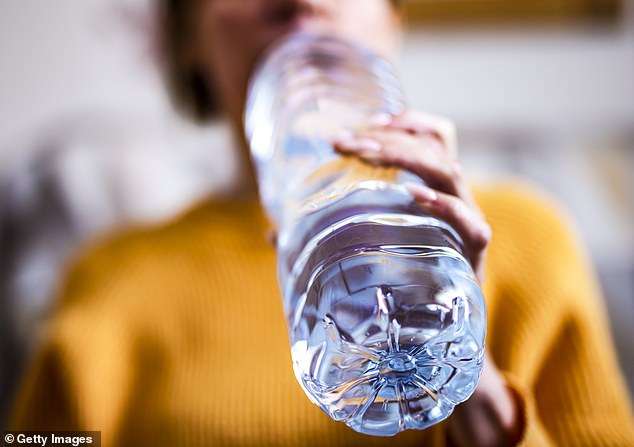Drinking from plastic bottles may raise blood pressure as a result of microplastics entering the bloodstream, a study suggests.
According to other research, microplastics have also been found in liquids contained in glass bottles and experts say the associated higher blood pressure can lead to an increased risk of heart disease.
The latest study found that blood pressure decreased after participants stopped consuming all types of liquids, including water in plastic and glass bottles, and drank only tap water for two weeks.
Researchers from the Department of Medicine at the private Danube University in Australia said: ‘After extensive research, we concluded that drinks packaged in plastic bottles should be avoided.
Drinking from plastic bottles may increase blood pressure because microplastics enter the bloodstream, a new study suggests (file photo)
‘Notable trends were observed. The results of the study suggest, for the first time, that a reduction in plastic use could potentially reduce blood pressure, probably due to the lower volume of plastic particles in the bloodstream.
‘The changes we observed in blood pressure suggest that reducing plastic particle intake could reduce cardiovascular risk.’
Research shows that microplastics (microscopic fragments resulting from plastic degradation caused by UV radiation or the impact of a bottle) are ubiquitous.
Microplastics have been found in saliva, heart tissue, liver, kidneys and the placenta. Several studies have found high concentrations in water contained in plastic bottles.

New research shows that microscopic fragments resulting from plastic degradation caused by UV radiation or the result of a knocked-over bottle are ubiquitous (file photo)
In the new study, published in the journal Microplastics, researchers asked eight men and women to consume their daily fluid intake from tap water and told them to refrain from consuming beverages stored in plastic or glass bottles.
Several blood pressure measurements were taken at the start and during the study. The results showed a statistically significant decrease in diastolic blood pressure (the pressure in the arteries when the heart is resting between beats) after two weeks.
The researchers said: “Based on our findings indicating a reduction in blood pressure with reduced plastic consumption, we hypothesized that plastic particles present in the bloodstream could contribute to elevated blood pressure.”

